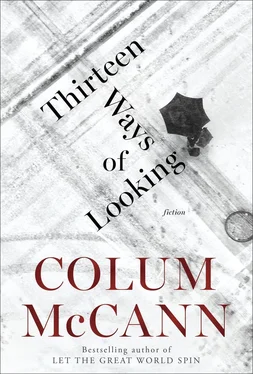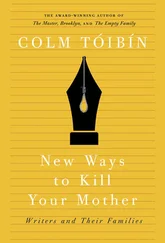— Terrible weather, says the waitress.
— When I was a boy it snowed ten times worse.
Which is not true at all. He can only remember Vilnius in the summertime.
— I never saw a snowflake until I moved here, she says.
— Australia?
— No.
— New Zealand?
— No.
She’s toying with me now: South Africa?
— Zimbabwe, she says, with a flourish.
Oh, toy and tarry. What a city this is. Never ceases to amaze me. A blonde Rhodesian girl serving a Polish-born Lithuanian Jew in an Italian restaurant with, what, a couple of Mexican busboys hanging out near the edges, ready to pounce, and of course Dandinho, the Brazilian busboy extraordinaire moving gracefully from table to table, and my big bald American son yammering away on the telephone by the coat check.
— And your name is?
— Rosita.
— Why, thank you, Rosita.
An unusual name for a girl from Africa. She smiles as she backs away. He nods at Dandinho who moves swiftly across to fill up his water glass.
— Thirsty today, sir?
— It’s the heat outside, young man.
Dandinho pours with great panache, one hand kept behind his back, as if his whole body is paying respect to the water glass. Not afraid to get his hands wet. An all-rounder. A meeter, a greeter, a half maître d’. Known far and wide for the way he can wrap your leftovers. An aluminum artist. No mean skill that. Nothing to snigger at. A folder of the foil. He can create any shape the diner wants — swan or porpoise or cow or crane or giraffe. Within seconds the leftovers become a work of art. A doggie bag, indeed. The kids love it but so do the ladies who lunch and indeed so do the late-night businessmen going home with an exotic aluminum animal under the arm. There was even, a few years ago, a gallery downtown that put on an exhibition of Dandinho’s foil sculptures.
— How’re you feeling today, sir?
— A million bucks. All torn and wrinkly.
A tolerant smile from Dandinho: he’s heard the quip before.
— Anything else, Mr. Mendelssohn?
— Fine for now. Waiting in fact for my son.
— Ah, yes. Some bread?
— Thank you, Dandinho, but I’m watching my figure.
And here he comes at last, lumbering across, hardly a figure skater, bumping off the tables and chairs. Tucking away his phone as he goes. Still there is an energy about him, nothing small or meek, that’s for sure, three Mendelssohns in one movement, father, son, symphony.
— Dad, he says, with a kind swerve in his voice, and a grasp of his father’s shoulder.
A bit of weight on him, sure, but he still has a pair of fine, bright eyes, the same shape as his mother’s. Speak to me of her, son, in a pattering hail-shower of words.
— Elliot, meet Dandinho.
— A pleasure, sir.
— My pleasure, Davido.
Elliot grasps Dandinho’s hand and doles out a big handshake. He’d make a good politician, even if he keeps getting names wrong. A sharp dresser too. Gold tiepin. Straight collar. Fine-cut cloth.
— Elliot Mendelssohn, he says, Barner Funds.
As if Dandinho gives a flying fig about Barner Funds, but the Brazilian pauses a moment, then reaches behind Elliot’s chair and holds it politely, scoots it in, or hardly scoots it at all, given Elliot’s proportions. Elliot shifts on the chair like it’s a dangerous horse. The table shivers a little and the silverware clangs.
— Thank you, Davido.
An odd look on Dandinho’s face, something rattling through his mind, a bronco, a bull, a bear. Is it possible that Dandinho speculates? One never knows. The unlikeliest of people get themselves into the market these days and who knows what sort of life goes on behind another life? Maybe Dandinho has himself a fine big mansion out there in Brooklyn somewhere, gold-plated handles, swimming pool, a Jacintha wife, the whole nine yards, the NASDAQ pulsing in neon around his shaving mirror, stranger things have happened, even to an aging busboy.
— A very solid firm, sir.
— You invest there, Dandinho?
— Oh, no, sir, not me, Mr. Mendelssohn. I just know some people.
— Don’t we all? says Elliot.
Dandinho nods and backs away.
The menu-flip. The napkin unfold. The usual pleasantries. Great to see you, son. Terrible weather. Sorry I’m late. A drone of excuses, more sound than meaning — he got caught in work, was waylaid on Lexington, some business deal fouled up along the way, he’s just swamped these days, time, time, time.
A fine wine of a man to make excuses: he gets better with age.
— I took the liberty.
— Thanks, Dad.
— A Cabernet for you, sir.
Elliot pretends not to take an eyeful as Rosita leans across him and places the wine down. She stands with her hands on the low of her stomach as she enumerates the specials. Quite a pose. That little speck of blue on her wrist: such a perfect addition, like the wrongly tied knot on a Persian carpet.
— Thank you, Rosita.
Salmon with dill sauce for him. A porterhouse steak, medium rare, with mango sauce for Elliot. No appetizers. Straight to the heart of the matter. She scribbles it down on a small blue pad, bats her eyelids, moves away, yes, an artist, no doubt. Salmon indeed. Watch her sway upriver, a fine expanse of flank.
— L’chaim, says Elliot.
So often the boy for the opportune word, there has recently been talk of Elliot running for office, a disastrous move, no doubt, even for a macher like him — they would chew him up and spit him out and freeze-dry him in the process — but who’s to fault ambition? And here we go, clinking glasses and diving into the old murky water, father and son, and how is Jacintha, and what’s happening at home, any news from Katya, all smooth with Sally, do you ever use the motorized chair, are you eating well enough, have you seen Dr. Marion?
They are halfway through their wine when Elliot’s phone rings.
— Excuse me.
A woman’s voice from the sound of things. Elliot is quick and curt. Yes, no, I can’t talk right now, absolutely not, she doesn’t have a case, forget it, I said I can’t talk right now.
He shuts the phone and says: Jesus H.
And why in the world is the H always thrown in there? Our Father, who art in Heaven, Harold be thy name. Eileen once said: Why not A for Art? Our Father, who is Art in Heaven. Or sling them both together? Jesus H. A. Christ.
Elliot presses the phone down on the table, fingers some buttons, a piano player, even with his big meaty hands, a Richter of the keyboard.
— You’re a busy man, Elliot.
— Just work stuff, sorry. It never stops.
— Lady problems?
— Aren’t they all?
He deserves a good clip on the ear for that one. Good thing Eileen’s not around, she’d whip him silly, march him into the bathroom and soap his mouth out.
— My secretary.
— I see.
— Had to fire her.
— Sorry to hear that.
— She’s trying to sue me.
— That’s not good.
— Give them an inch, they take a mile. Bitcharita.
A sting of a word. A shot of Patrón. Salt on the wound. Bitcharita. An immigrant to the language. Beyond the blonde wives, Elliot always had a bit of an eye for the Latin girls.
— Sounds complicated.
Elliot flicks a look off into the distance. A little tremble of his eyelid and a twist of the mouth. Impossible to forget that he was once six years old, out on the beach in Long Island, blue shorts, a patch of dry sand on his shoulder, leaning against his mother’s shoulder, a sandwich in his hand, Eileen’s arm around his waist, the waves rolling up to shore, when he was the boy he seemed destined to be.
And there it is again, shimmying and shaking, vibrating on the table, what is this, Candid Camera ?
Читать дальше












